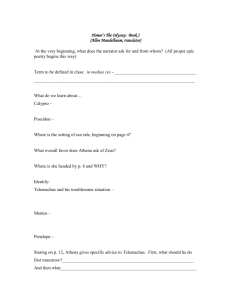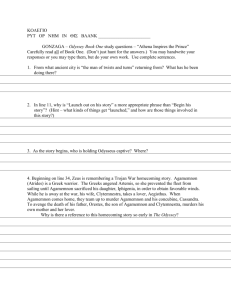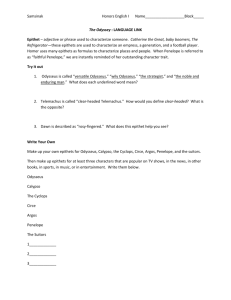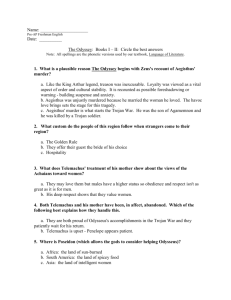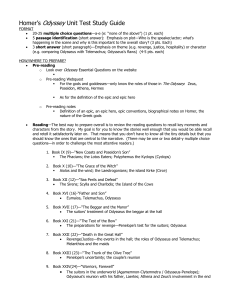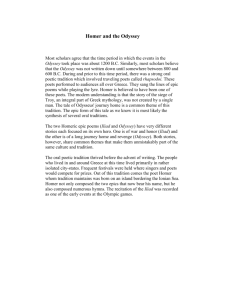odyssey essay
advertisement
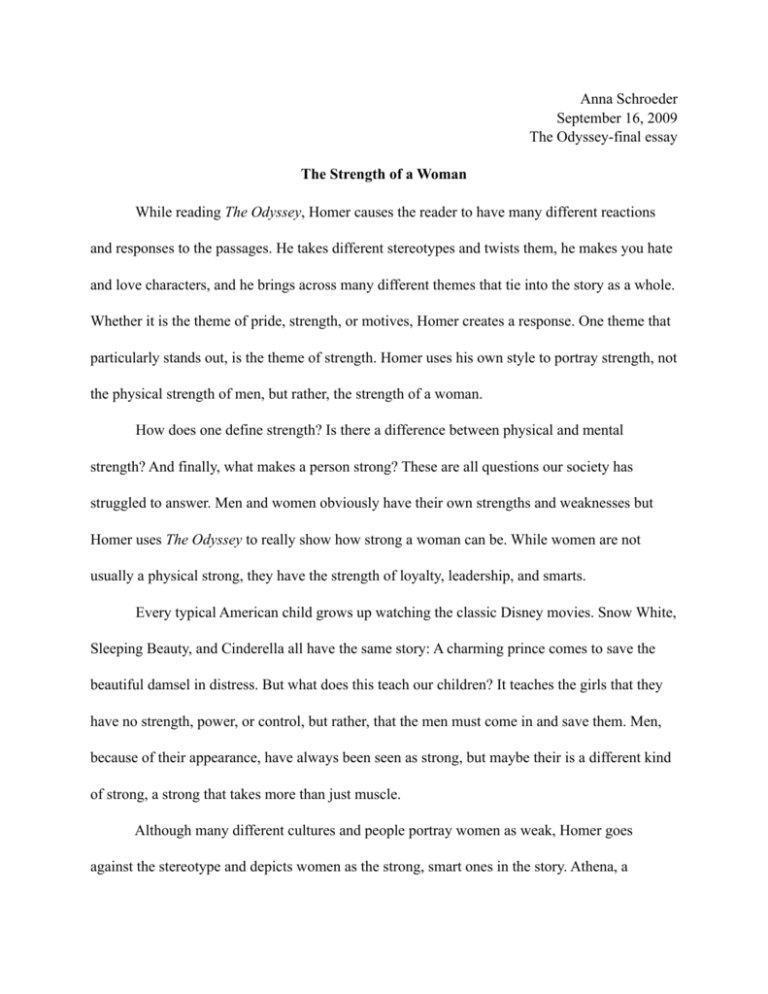
Anna Schroeder September 16, 2009 The Odyssey-final essay The Strength of a Woman While reading The Odyssey, Homer causes the reader to have many different reactions and responses to the passages. He takes different stereotypes and twists them, he makes you hate and love characters, and he brings across many different themes that tie into the story as a whole. Whether it is the theme of pride, strength, or motives, Homer creates a response. One theme that particularly stands out, is the theme of strength. Homer uses his own style to portray strength, not the physical strength of men, but rather, the strength of a woman. How does one define strength? Is there a difference between physical and mental strength? And finally, what makes a person strong? These are all questions our society has struggled to answer. Men and women obviously have their own strengths and weaknesses but Homer uses The Odyssey to really show how strong a woman can be. While women are not usually a physical strong, they have the strength of loyalty, leadership, and smarts. Every typical American child grows up watching the classic Disney movies. Snow White, Sleeping Beauty, and Cinderella all have the same story: A charming prince comes to save the beautiful damsel in distress. But what does this teach our children? It teaches the girls that they have no strength, power, or control, but rather, that the men must come in and save them. Men, because of their appearance, have always been seen as strong, but maybe their is a different kind of strong, a strong that takes more than just muscle. Although many different cultures and people portray women as weak, Homer goes against the stereotype and depicts women as the strong, smart ones in the story. Athena, a goddess, is the protector of both Telmachus and Odysseus, Penelope, Odysseus’ wife, stays loyal to her husband for the twenty years that he’s gone, and both of them use their smarts to manipulate different events in the story. Of course, Homer shows their weaknesses too. Just like the men, the women need the help of the gods, they can be selfish, and they aren’t always courageous, but in a society where women have hardly any power, the fact that they are so strong in the story is a powerful statement. Homer uses different ways to portray the different character’s personalities and usually he creates either a positive or negative response to them. We find out that Odysseus is prideful, that Telemachus lacks courage, and that the gods are childish, but rarely do we see the flaws of the women in the story. Athena is introduced as “the bright-eyed goddess” and Penelope is introduced as “Wise Penelope, daughter of Icarius, courage!” (1, 367)(16, 482) While one reads the story, they may feel angry or resentment towards the men, but appreciation towards the women. I believe Homer did that on purpose. Homer makes a statement by using Athena, a girl goddess, as Odysseus’ and Telemachus’ protector. Without Athena these two men are nothing. When either of them needed courage or a strong appearance, Athena provided. Telemachus, an insecure teenager, gained courage when Athena was with him, “Poised Telemachus answered,/ filled with the heart Athena herself inspired...” (3, 84) Often, Telemachus and Odysseus wouldn’t have had the courage to say or do anything without her. She uses her strength as a leader to help their strength. Athena helps the men not only in courage but also in appearance: “As a master craftsman washes gold over beaten silver-a man the god of fire and Queen Athena trained in every fine techniqueAnd finishes off his latest effort, handsome work, So she lavished splendor over his head and shoulder now.” Whether they needed courage or a good appearance, Athena knew how to help the men accomplish their goals. Loyalty is another way Homer shows the strength of women. While Odysseus disappears for twenty years, Penelope shows her strength by staying faithful to her husband. Telemachus exclaims in book two that, “Suitors plague my mother-against her will-/sons of the very men who are your finest here!” (2, 55) Even with men all around her, trying to marry her, Penelope stays loyal to the men she truly loves, Odysseus. On the other side of the spectrum, Odysseus falls short of loyalty. In The Odyssey, we hear of twice where he commits adultery against his wife. With Calypso, the lustrous goddess, they withdrew “...into the cavern’s deep recesses, long in each other’s arms they lost themselves in love” (5, 250). The book does not tell us of any guilt that Odysseus felt for betraying his wife and even after Calypso, he cheats on her again. Circe, a witch-goddess, falls in love with Odysseus. Knowing she wanted to “mix in the magic work of love” (10, 371), Odysseus made her vow to never harm him again, “and when she’d finished,/ then, at last, I mounted Circe’s gorgeous bed...” (10, 385) Penelope does not even know if her husband is alive, and yet, she still remains loyal to him. Odysseus, on the other hand, has a wife waiting for him at home, and still cheats on her twice. Penelope exhibits the true strength of loyalty and as a reward, Odysseus “...wept as he held the wife/he loved, the soul of loyalty, in his arms at last” (23, 260) Finally, Penelope and Athena show their strength through their smarts. While some may see manipulation as a bad thing, both of them use their womanly cunning to their advantage. Penelope portrayed this best when she tricked the suitors. One day she declared to the suitors, “young men, My suitors, now that King Odysseus is no more, go slowly, keen as you are to marry me, until I can finish off this web...” (2, 104) But Penelope knew what she was doing, and “...by day she’d weave at her great and growing web-/ by night, by the light of torches set beside her,/ she would unravel all she’d done” (2, 116). Penelope used this tactic for three years to avoid marriage until a maid told the suitors the truth. Athena also uses her smarts to help Telemachus and Odysseus. Knowing what gets men motivated, Athena often comes disguised as men to help them along with their journey. For example, “And down she swept form Olympus’ craggy peaks And lit on Ithaca, standing tall at Odysseus’ gates, The threshold of his court. Gripping her bronze spear, She looked for all the world like a stranger now, Like Mentes, lord of Taphians” (1, 119) Later, Mentes, or Athena, takes the initiative to get Telemachus fired up about the suitors living in his house and from there on gives him the courage to stand up for himself. Much of this story is about heroics. In the end, Odysseus and Telemachus regain their house back, but without the help of Athena and Penelope they would not have been in the same place. Homer does a good job of giving women the respect they deserve. They didn’t need muscle to get the job done. The strength of man is never doubted, it is just the strength of women that makes the statement in this story. Book seven defines the different strengths nicely: “Just as Phaeacian men excel the world at sailing, Driving their swift ships on the open seas, So the women excel at all the arts of weaving. That is Athena’s gift to them beyond all othersA genius for lovely work, and a fine mind too.” (7, 124)
